Atelier Sandemar's Oona deck chair is designed to make lounging under the warmth of the sun a little bit more enjoyable. Designed by David Ericsson, the outdoor armchair is a delightful mix of oak frame and white steel handles, radiating a cheerful and carefree vibe whether you place the chair on a balcony, patio, garden or even indoors. The chair is, like other furniture in the Oona collection, skillfully crafted in Sweden.
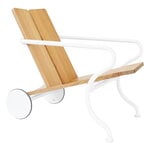
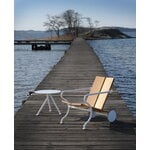
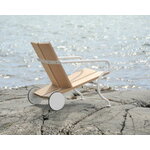
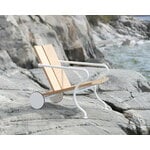
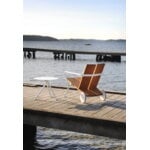
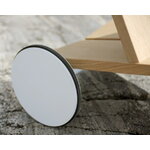

Oona deck chair, white
Atelier Sandemar
Description
Atelier Sandemar's Oona deck chair is designed to make lounging under the warmth of the sun a little bit more enjoyable. Designed by David Ericsson, the outdoor armchair is a delightful mix of oak frame and white steel handles, radiating a cheerful and carefree vibe whether you place the chair on a balcony, patio, garden or even indoors. The chair is, like other furniture in the Oona collection, skillfully crafted in Sweden.
Product details (11)
- Colour
- White, oak
- Width
- 53 cm
- Depth
- 76 cm
- Height
- 69 cm
- Seat depth
- 48 cm
- Seat height
- 30 cm
- Frame material
- Powder-coated galvanized steel
- Backrest material
- Oak
- Seat material
- Oak
- Weight
- 20 kg
- Care instructions
- We recommend treating the wooden parts with a thin layer of linseed oil once a season.
- Product ID
Designer
David Ericsson is a Swedish designer known for his commitment to creating products that stand the test of time and adapt to the evolving needs of our environment. His goal is not merely to provide short-lived trends but to develop services that stay for years to come. In recognition of his exceptional work, Ericsson has received numerous prizes and nominations. In 2022, he was honoured with the prestigious title of "Designer of the Year" by Residence magazine. One of his notable achievements includes the Oona chair which was crowned "Furniture of the Year" by Sköna Hem in 2020. Ericsson has studied at the prestigious Carl Malmsten Furniture School.
View all productsReviews (0)
Sustainability
The Product Sustainability Framework, our criteria of sustainable design, helps you find the most sustainable products in our selection. Read below which sustainability criteria this product has met.
Working conditions & labour 8/9
-
Equal opportunities for all employees
-
Commitment to UN Global Compact, fair compensation for all employees
-
Corporate responsibility requirements defined and communicated for suppliers
-
Systematic work for improved inclusion and well-being in the workplace
-
Transparent supply chain
-
Suppliers' compliance to a code of conduct ensured
-
Compliance to the UN Guiding Principles on Business and Human Rights ensured in the supply chain
-
Support for community involvement in the supply chain
Eco-friendly production 8/9
-
Fair and resource-wise water-use in production
-
No incineration or landfilling of returned items
-
No use of endangered species as materials
-
No direct environmental emissions or waste (excl. GHGs) from production
-
The sustainability of direct suppliers' production is addressed and monitored
-
Production and material sourcing that respect biodiversity, animal rights, and natural ecosystems
-
Material-efficient and ecological packaging
-
No potentially harmful chemicals used in own production
Climate impact 5/8
-
Company's direct greenhouse gas emissions identified and commitment to reduction
-
Product's carbon impact identified and commitment to reduction
-
Guidance on energy- and eco-efficient use of the product
-
Contribution to climate initiatives beyond the brand’s direct operations
-
Low-carbon or compensated transportation
Sustainable materials 5/6
-
Sustainable and long-lasting material choices
-
No harmful or hazardous substances
-
Responsible raw material sourcing and production
-
Materials suited for circularity: monomaterials, recyclable finishings, renewable or recycled contents etc.
-
Ecological materials: natural, biodegradable, recyclable or recycled contents
Circular design 5/5
-
High aesthetic quality promoting long-term use of the product
-
Technically durable product design and material choices
-
Design for enduring life-long quality
-
Design and support for product maintenance, repair and upgradability
-
Innovative circular design solutions: circular service system, resale platform, remanufacturing, collection of used products, etc.











